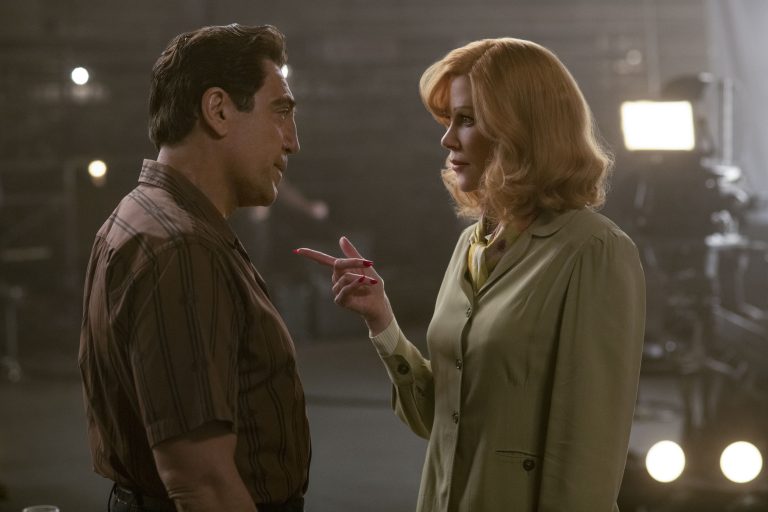
No matter what political challenges the U.S. has faced throughout its history, many of its citizens have turned to the entertainment industry to seek refuge in the professional and personal lives of Hollywood’s most elite performers. However, Americans’ reliance on, and the way they access, the latest news about their favorite actors and musicians has drastically evolved since the invention of television, shortly after which I Love Lucy became one of the country’s first acclaimed sitcoms.
As a result of continuously growing interest in celebrities’ lives and technological advancements, the new drama, Being the Ricardos, is offering an ind-depth, behind-the-scenes glimpse into the intimate details of I Love Lucy‘s famous stars, Lucille Ball and Desi Arnaz. The personal movie was written and directed by Academy Award-winning filmmaker, Aaron Sorkin, and stars Nicole Kidman and Javier Bardem as Ball and Arnaz. The Oscar-winning actors are joined on screen by Academy Award-winner J.K. Simmons and Nina Arianda, who play their I Love Lucy co-stars, William Frawley and Vivian Vance.
Being the Ricardos offers a revealing glimpse into Ball and Arnaz’s life as an on-and-off screen couple while they’re threatened by shocking personal accusations, a political smear and cultural taboos. The couple’s complex romantic and professional relationships are set against the writers’ room, the show’s soundstage and behind closed doors during one critical production week of I Love Lucy.
Sorkin, Kidman, Bardem, Simmons, Arianda and actress Alia Shawkat, who played one of I Love Lucy‘s writers, Madelyn Pugh, generously took the time earlier this month to promote Being the Ricardos during a Q&A at Florence Gould Hall in New York City. The film is now playing in a limited theatrical release in the United States, courtesy of Amazon Studios. The drama will begin streaming worldwide on Prime Video on December 21.
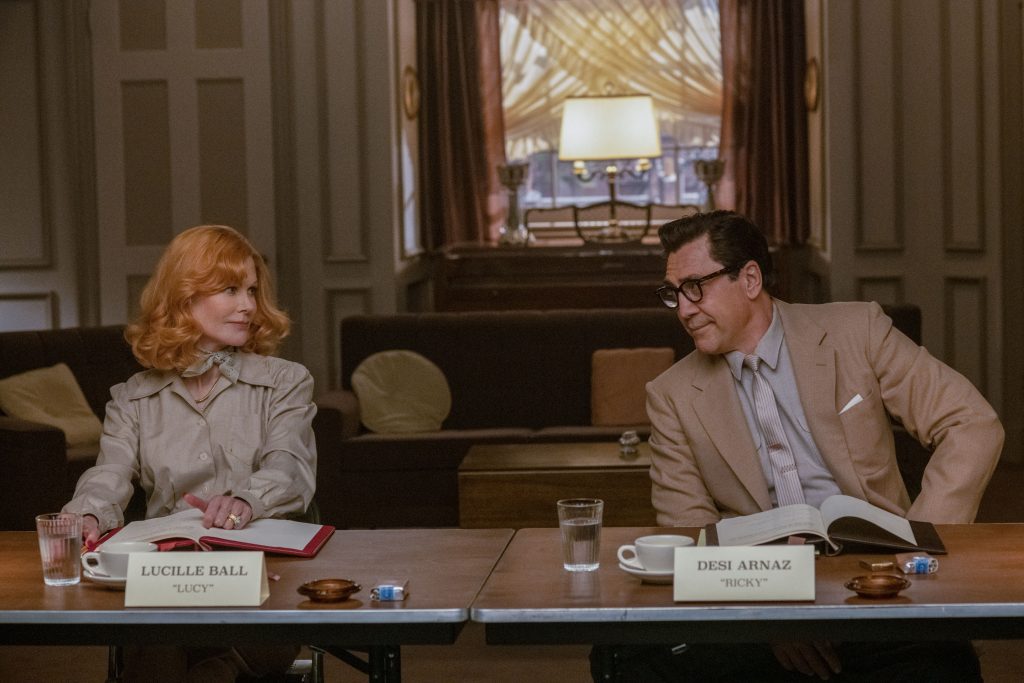
Q: Aaron, the film is about a host of issues that are still so relevant today, but their specificities to Lucille Ball and Desi Arnaz are also so unique. What was the process like of fitting those issues into the course of one week?
AS: Everything that happens in the movie actually happened [in real life], but they just didn’t happen in the same week. I like to compress time and space [in films], and keep as much pressure on, and as many obstacles in front of, the protagonists as I can.
Q: Not only did these things actually happen, but the way Lucy and Desi dealt with these obstacles was indicative of how a powerful couple in that moment would really react. The obstacles are all compressed into the film’s story in the typical Aaron Sorkin way.
AS: That was the idea of putting that much pressure on them. You’re going to learn about them under those conditions…as really interesting conversations bubble to the top. There’s an argument in every scene.
Q: Nicole, you gave a phenomenal performance as Lucy. But this film isn’t a biopic, and you’re not doing an impersonation of Lucille Ball on I Love Lucy; you’re playing a multi-faceted, creative businesswoman and artist who fought her way through the industry. What were some of the ways you found your way into the character?
NK: It was all written on the page; the screenplay is so good. But it was also me pretty much going, “Aaron, I really feel like I need this wig, a nose and chin; I need something – give me something.”
He said, “No – I just want you to create the woman. I want you to work from her wants and needs that make her a human being. That’s the way in, Nicole.”
I was in Australia a couple of months before we started shooting, during the middle of the pandemic, so I was able to just study the I Love Lucy show. That was my way of being able to hang my hat on something, which was her physicality.
I then started to slowly work on the voice of Lucy [on the show], and then on the voice of Lucille [in real life]. Aaron wanted her to have a distinct sound as Lucille, which had a much deeper register. That was based on her smoking a lot; she was a heavy smoker.
There was also a particular directness in the way in which she behaved. She always said, “I’m not funny; I create comedy, but I’m not a funny person.” She actually wasn’t that funny; she had irony and wit, but she was able to be comedic. But that took a lot of work and concentration, as we see [in the film].
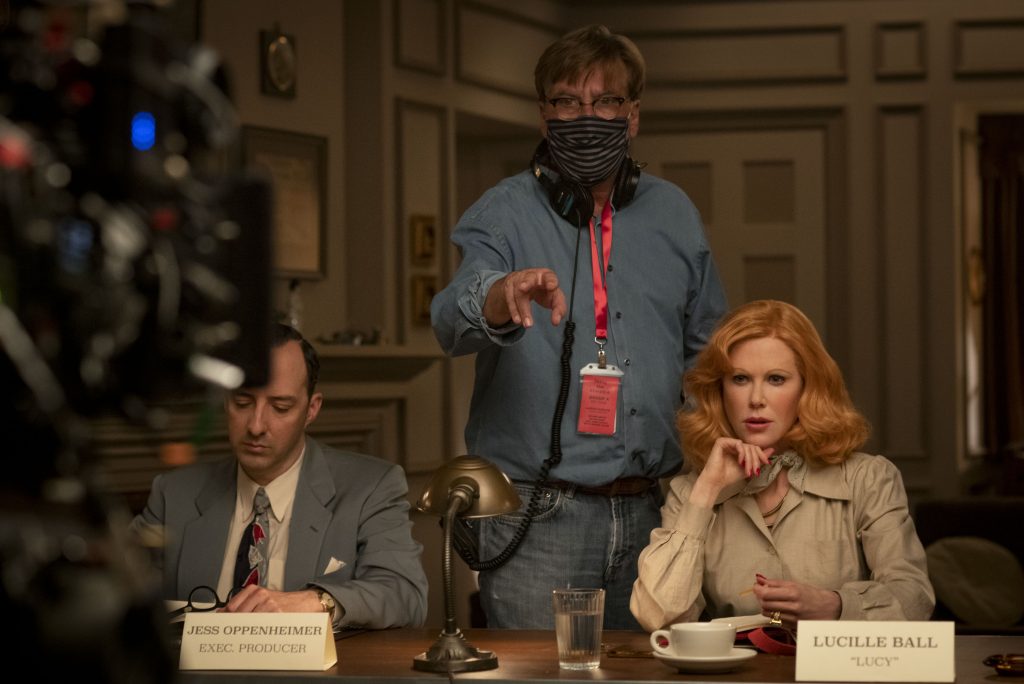
Q: Javier, you also gave an amazing performance. The importance of Desi Arnaz in the history of entertainment, and also in a cultural and technical innovation sense, is even underestimated by people who know pop culture and the history of entertainment. His charm, patriotism and sense of self were just as important to him as his business drive. What were some of the ways that you found your way into the character for the film?
JB: First and foremost, the work of Mr. Sorkin in the script is amazing. So the work of bringing his dialogue for any actor is not only a gift, but also a big responsibility, because you have to fulfill that truth as much as you can. But his script is a great guide.
I didn’t know this story at all. In Spain [where Bardem was born and raised], I Love Lucy wasn’t shown, so I started to watch the episodes [here in the U.S.] years before [filming on Being the Ricardos began]. I heard Aaron was writing the script for this film, so I thought, I want to know about that. As I began to watch the show, I started to fall in love with Desi Arnaz and what he represented.
I then did what every actor does and began to study. I read his biography, which is just called A Book by Desi Arnaz, and it’s very powerful. I did my best to just interact with, and inhabit, him. I tried to achieve as much as we all did, so it was necessary to have all of those words and amazing scenes that Mr. Sorkin wrote.
Q: You’re right; there’s really only that one book that’s just about Desi.
AS: There are a stack of books about Lucy and Desi, but most of them aren’t very good because they were written for fans of I Love Lucy. So there isn’t any bad news about Lucy and Desi in those books.
I really love Desi’s book that Javier just mentioned. He was a great storyteller…as he wasn’t afraid to go to the dark places of their story.
Q: J.K., you did a great job representing the grumbles of William Frawley on I Love Lucy. The film is a bridge to the important things that led the characters to the events that happened in 1951 [which is when Being the Ricardos is set], culturally and entertainment wise. Frawley is also a bridge to Ball and Arnaz in that era.
JKS: That’s absolutely right. I think that Bill, not unlike myself, is the elder statesman of the group…I think he brought so much with him to the show from his time on Broadway. He was also a character actor who played small parts.
In his better relationships amongst these people, he was the kind uncle to Lucille, and kind of a big brother-figure to Desi. He and Desi became very good friends, but he and Viv, not so much. Like all actors, he was hard on the writers. He was maybe not the kind grandfather that Alia’s character was looking for!
Q: That’s a good segue to talk about Vivian Vance being a counterpoint to Lucille Ball. Nina, talk about the delicate walk that Vivian had to do behind the scenes [of I Love Lucy] with Lucille.
NA: I embarrassingly did not know much about Vivian Vance [before filming began on Being the Ricardos]. I knew a lot about Ethel because I watched the show, lovingly. So [the show’s behind the scenes details] really blew my mind.
I was surprised to learn that Vivian was an object of desire and leading lady. So she’s trying to get herself back, after being placed and kept in this box…being kept in that box, after being so popular in her real life, was extremely painful in certain respects.
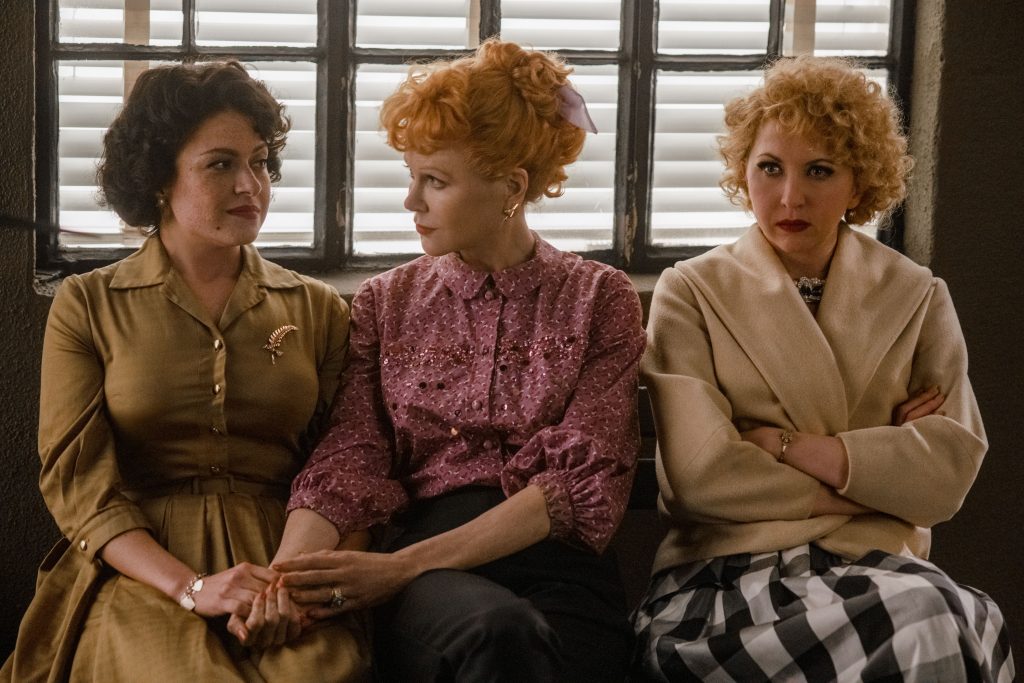
Q: Alia, you also gave an amazing performance as Madelyn. The importance of Lucille Ball’s early comedy can’t be understated, especially in the scene where Madelyn was talking to Lucille about the messages she was putting out. What were the ways that you figured Madelyn out while you were playing here?
AS: I love that scene so much. The whole film was such a pleasure to do, especially Madelyn’s character; she carries a lot in that scene, and it was tightly written. The fact that she’s talking about that she’s a woman of another generation and is trying to give her some advice is great.
But she’s also talking to her idol, who’s given her this amazing opportunity. There obviously weren’t a lot of female writers at that time, and it was a huge hit show. Even though they’re really snarky the whole time, they’re not getting enough credit and are fighting back.
Madelyn is so grateful to have Lucille in her life that she wants her to be smarter. Obviously, Lucy in the show is so smart, but she’s also goofy, and she knows she’s goofy, while also being funny. It’s an interesting way of doing comedy, and Lucille Ball is one of the biggest female comedians of that era, but women have evolved in comedy since then.
Q: J.K., in addition to his signature waistbands that he wore up to his chest, the physicality of William Frawley is so memorable. His character’s physicality worked with his wit. What was it like creating that physicality?
JKS: It was great to find the little opportunities to highlight that physicality, especially in the few recreations that we have from the show, particularly the ones that feature Vivian and Bill. We all got to do something that was really close to an impression [of the actors they played].
I found that since there’s less written about him than the other three, and less video of him outside of his films and the show, it was freeing for me to portray him, in a way. But as I watched the show, as we all did, for months, I found a few things that physically anchored me into comfortable positions to walk across the stage.
Susan Lyall, our wonderful costume designer, went through a variety of choices of how to, or whether we should even, pad my costumes. I hope we ended up with a very subtle and believable version of the way he carried himself, including the way he wore the waistband on his pants…That was a very important aspect of how to play him.
Q: Nina, further speaking of the physicality, there’s an aspect of you with your shoulders as you’re playing Vivian. But when she has to be on camera playing Ethel, it seems like gravity is pulling her down. You show a beautiful mixture of her interior and exterior struggles.
NA: Yes, I agree. I had access to one video of Vivian as herself; it was when Desi introduced the cast to the audience before they start the show. That blew my mind because it was so different than Ethel. In that video of Vivian, you see the dancer in her, with her shoulders back, and being aware of her hips.
But as Ethel, she cowered from that; she weighted herself in her ankles and feet, as opposed to having this up energy. So that was a big in to how I should play Vivian, and how she was trying to validate everything in her life.
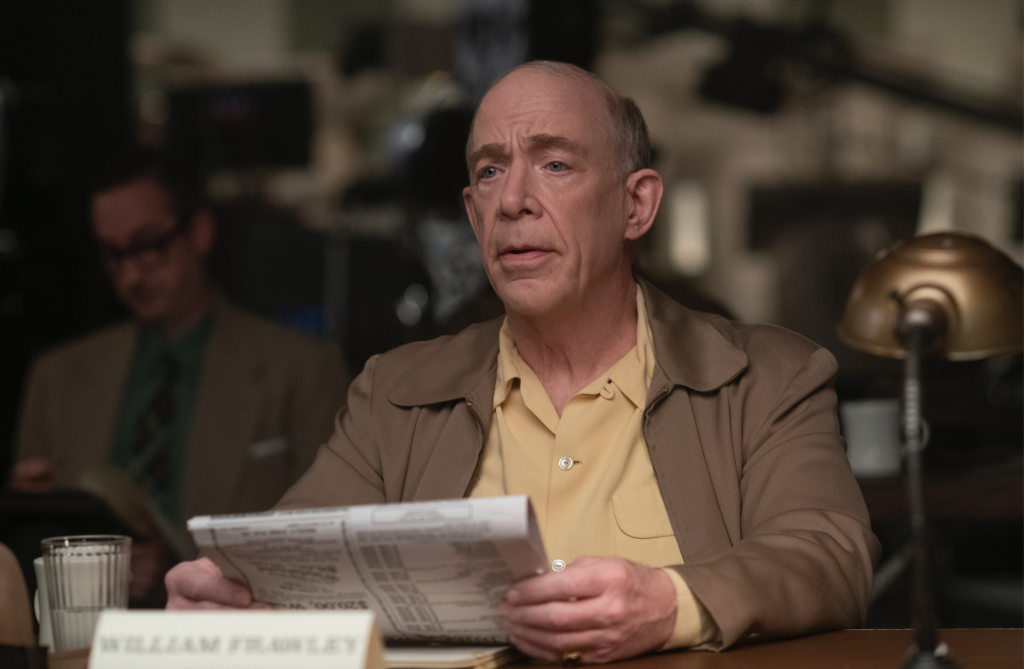
Q: Javier and Nicole, how did you find the duet between Desi and Lucille, both physically and in the emotional rhythm, since they were so different from William and Vivian?
JB: I definitely agree-there was a unique dynamic between Desi and Lucille.
NK: We really wanted there to be chemistry.
JB: We met on a Friday, and then started shooting on that Monday. So we had to have instant chemistry!
NK: We had dance rehearsal on a rooftop. We had a read-through, and then had to practice a rumba dance together, which is a great way to immediately get to know somebody.
We were also able to spend time together and talked a lot. I think we both also work in a very similar way; we’re very responsive. We responded to each other all the time.
AS: Chemistry between actors is something that you can’t predict. You know when you cast these actors that you’re going to get great performances from them, but there’s no way you can predict chemistry.
But the first shot that we had with Javier and Nicole as Desi and Lucy was of them walking onto the soundstage for the scene of the I Love Lucy table read. As the big doors open to let them walk in, Bill, Vivian and the writers turn around…and you can just tell Javier and Nicole have chemistry.
NK: It was incredible to work with Javier; he’s incredibly open and generous, as was everyone else on this stage…Everyone was working together, and their generosity was great.
Q: Going back to the film’s first table read, what was that experience like of getting everyone together to begin rehearsals?
AS: Well, we made the entire film during COVID, and we had to have 50 people at the first table read. So we did it outside, on top of a parking garage. Everybody had to be six feet apart, so there were parts where the actors were reading a scene with someone who was half a football field away.
Yet, we still got the sense from that table read that we were going to be okay! We also felt like the movie had been well cast.
NK: You did look nervous, though! I was like, “How was that, Aaron?,” and you were like, “We’ll get there.”
AS: We also had the rumba rehearsal on top of that parking garage. But overall, it was great to watch these guys during the rehearsals.
Q: Aaron, the best films teach us something we didn’t know, as well as something about ourselves, and Being the Ricardos absolutely does that. What do you want people to take away from the film?
AS: There are a few things. But the main one is about the tragic nature of Lucy and Desi’s love; they were deeply in love with each other until the day they died, but they had this tragic flaw in them that prohibited their marriage from getting to where it needed to be. So I hope people realize that true love never goes away, even when a marriage ends.
Here’s the trailer of the film.

